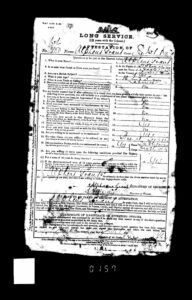In order to give a sense of how different types of records fit together, here is a compilation of the records we have for Alpheus Henry Wicliffe Grant. Grant was born in Hagley Gap, Jamaica in 1882. At 18 he was working as a labourer and signed up to join the West India Regiment on 22 January 1900. His service record shows his career up to 1914 during which time he was promoted to Corporal, then Serjeant. Before the start of the First World War he had served in both the West Indies and West Africa. In 1916 he was transferred to East Africa, and then to Palestine before returning to the West Indies in 1919.

Alpheus Grant’s attestation, the document from when he first enlisted in 1900 (catalogue reference WO 363/G933)
Looking at the record itself, we can clearly see how narrowly it missed complete destruction by fire damage. What remains in the service record is a detailed timeline of the period that Alpheus Grant was a member of the West India Regiment, 11 years, 342 days. We can see that he was hospitalised for malaria in 1917. There is even a record of his marriage to Adella Eugenia Lowe, at Jacks’ Hill St Andrew, Jamaica on 5th November 1914, along with the names of their two witnesses.
In addition to that service record, we are able to find the records related to the medals that Grant was awarded. We can find two ‘medal index cards’, and a listing in the London Gazette. The medal index cards were part of the administrative system that recorded and organised the award of medals across the armed forces. One of these medal cards is for Grant’s ‘campaign’ medals that recognised his participation in particular fields of action. The other is for Grant’s ‘gallantry medal’, in this case the ‘Distinguished Conduct Medal’ that recognised a specific act of bravery while he was serving in East Africa. During the First World War, the London Gazette published details of those who were awarded gallantry medals, including the ‘citation’ or reason for which the medal was awarded.

You can find further records of the campaign and service medals won by Grant in the medal index cards. Here (WO 372/8/96891) we see him not listed by his full name but as A. Grant of the 2 West India R. (2nd West India Regiment). We can still see his regimental number (3953) that shows it is the correct individual. The index card shows he was awarded the Victory medal, the British War Medal and the ‘15 Star.

In this record (WO 372/23/55549) we can see him listed again as A. Grant, with the same regimental number 3953, in W. Ind. R. (West India Regiment). This is the index card for his Distinguished Conduct Medal (D.C.M.).

Here we can see the citation for Grant’s Distinguished Conduct Medal as published in the London Gazette on the 25th of August 1917 (the ‘citation’ is the reason given for the award of a medal). Supplement to the London Gazette, 25 August 1917, p8834 – image use under Open Government Licence.
Finally, returning again, to the service record, we can see the end of Grant’s military career, and his retirement from the West India Regiment. In his service record, we see the authorisation of pension payments to him from Chelsea Hospital in 1921. For his years in service he was awarded 20d (pence) per day for life. We don’t have a record of how Grant felt about his time in the army or whether his pension fully recognised his long service. We do know, however, that in 1980, at the age of 99, he put his uniform back on and was celebrated by the Governor-General of Jamaica in a Remembrance Day service.

Alpheus Grant was awarded a pension of 20d per day for life in 1921 (WO 363/G933).
Beginning your own search
Not every individual will have such a rich paper trail as Alpheus Grant, however, we may still have records which can help build the histories of those who served.
This guidance has barely begun to unpack the many ways in which individuals from the Caribbean contributed to the British and Allied efforts in the World Wars and beyond. Further tens of thousands of others participated through service in the merchant navy (commercial shipping that was commandeered for the war effort), through military nursing and medical care, through working to support the war effort in agriculture or forestry, or through service in administration or engineering. Many Caribbean contributors to these arenas also had to overcome barriers to serve and to be recognised for their service.
For more information on researching Caribbean family history, our online guide to researching individuals from the Caribbean is a good place to start. This offers an overview of the relevant records at the National Archives, and how to best search for them. We still have work to do to fully identify the location of Caribbean-related military records within our collections, so please get in touch with our records specialists via our contact pages for support in your research.
